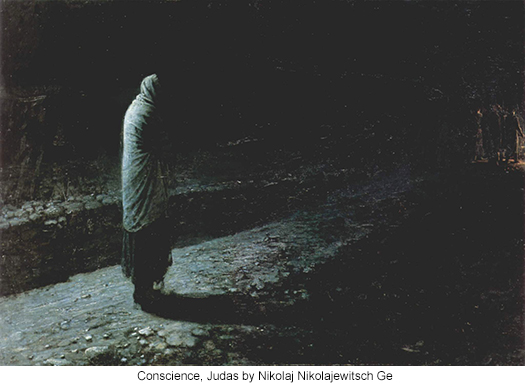
181:2.6 And then the Master, passing around his own seat, paused a moment by the side of the place of Judas Iscariot. The apostles were rather surprised that Judas had not returned before this, and they were very curious to know the significance of Jesus' sad countenance as he stood by the betrayer's vacant seat. But none of them, except possibly Andrew, entertained even the slightest thought that their treasurer had gone out to betray his Master, as Jesus had intimated to them earlier in the evening and during the supper. So much had been going on that, for the time being, they had quite forgotten about the Master's announcement that one of them would betray him.
182:0.2 As Jesus and the eleven made their way back to camp, the apostles began to wonder about the meaning of Judas's prolonged absence, and they spoke to one another concerning the Master's prediction that one of them would betray him, and for the first time they suspected that all was not well with Judas Iscariot. But they did not engage in open comment about Judas until they reached the camp and observed that he was not there, waiting to receive them. When they all besieged Andrew to know what had become of Judas, their chief remarked only, "I do not know where Judas is, but I fear he has deserted us."
182:2.1 The apostles were greatly shocked when they returned to their camp and found Judas absent. While the eleven were engaged in a heated discussion of their traitorous fellow apostle, David Zebedee and John Mark took Jesus to one side and revealed that they had kept Judas under observation for several days, and that they knew he intended to betray him into the hands of his enemies. Jesus listened to them but only said: "My friends, nothing can happen to the Son of Man unless the Father in heaven so wills. Let not your hearts be troubled; all things will work together for the glory of God and the salvation of men."
182:2.4 Resentment of Judas's being a traitor for the moment eclipsed everything else in the apostles' minds. The Master's comment in reference to Judas, spoken in the course of the last prayer,opened their eyes to the fact that he had forsaken them.
182:2.7 In ordinary circumstances the apostles would have bidden the Master a personal good night, but this evening they were so preoccupied with the sudden realization of Judas's desertion and so overcome by the unusual nature of the Master's farewell prayer that they listened to his good-bye salutation and went away in silence.
182:2.9 None of the apostles expected anything out of the ordinary to happen that night since it was already so late. They sought sleep that they might rise up early in the morning and be prepared for the worst. They thought that the chief priests would seek to apprehend their Master early in the morning as no secular work was ever done after noon on the preparation day for the Passover. Only David Zebedee and John Mark understood that the enemies of Jesus were coming with Judas that very night.
183:0.3 ...the Master...walked down toward the olive press near the entrance to Gethsemane Park. Although the three apostles, the Greek, and the other members of the camp hesitated immediately to follow him, John Mark hastened around through the olive trees and secreted himself in a small shed near the olive press. Jesus withdrew from the camp and from his friends in order that his apprehenders, when they arrived, might arrest him without disturbing his apostles. The Master feared to have his apostles awake and present at the time of his arrest lest the spectacle of Judas's betraying him should so arouse their animosity that they would offer resistance to the soldiers and would be taken into custody with him. He feared that, if they should be arrested with him, they might also perish with him.


